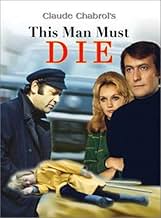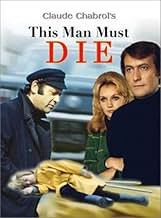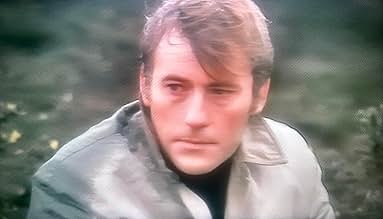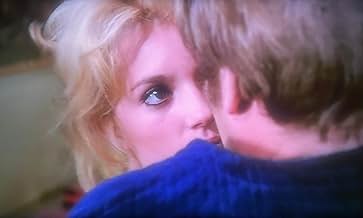Que la bête meure
- 1969
- Tous publics
- 1h 50min
NOTE IMDb
7,6/10
5,2 k
MA NOTE
Un homme s'affirme dans la vie d'une actrice qu'il croit être en quelque sorte responsable de la mort de son fils.Un homme s'affirme dans la vie d'une actrice qu'il croit être en quelque sorte responsable de la mort de son fils.Un homme s'affirme dans la vie d'une actrice qu'il croit être en quelque sorte responsable de la mort de son fils.
- Réalisation
- Scénario
- Casting principal
- Récompenses
- 1 victoire au total
Avis à la une
"Que la bête meure " belongs to Chabrol's golden era.This is one of his most brilliant achievements,and,nevertheless,he would do even better with the next one"le boucher",with,again,Jean Yanne,an actor,who,before ,was featured in generally mediocre commercial movies.In his two films with Chabrol ,Yanne will show skills we would never thought of.Both characters,in "que la bete..." and "le boucher" are monsters;but monsters of different kinds:in "le boucher",Yanne is pitiful,moving,a product of the war (in Algeria?)On the other hand,in "Que la bête...",he's a hateful vulgar petit bourgeois brute.Compare the way Chabrol introduces his characters:in "le boucher",Popaul appears in the first scene,the wedding banquet,and he seems a good guy.In "Que la bête...",Chabrol does not show his face during Duchaussoy's son death on the road.When finally,the father discovers the reckless driver's house,we meet first his scared family circle.Then we hear his formidable voice.All happens like in a fairy tale:Tom Thumb entering the ogre's den.Perhaps Chabrol's most terrifying character, he holds up to ridicule his wife's attempt at poetry and he cannot understand his son ,a frail,sensitive,and clever teenager. The plot will take shape quickly,and after this story of sound and fury,the last pictures brings the audience some relief.Note,in both films,"le boucher" and "Que la bête.." ,the presence of water in these last pictures.
If there is a Gallic director who likes to surprise his admirers with new tricks,unexpected methods and iconoclastic stance,it is new wave master Claude Chabrol.There have been many bright moments in his illustrious career when he has made films for them which could only be appreciated by a sharp brain and attentive eyes.Que la bête meure is a hard to classify film which is neither a thriller nor a run of the mill revenge drama.It is a film which plays with all leading conventions of these two genres.This man must die starts well with the depiction of a reckless accident.It is quite possible that this might induce inattentive viewers to regard it as a revenge drama.This is not the case as viewers are quickly caught in a maze of crucial dramatic scenes that have direct bearing on film's progress.Caroline Cellier and Michel Duchaussoy perform well as lovers whose relationship has a lot of bearing on this film's progress.Chabrol is known for avoiding a not so happy end for his film.This is the reason why "This man must die" will prepare you to imagine your own type of end in order to do injustice to the concept of happy end of this film.
A particularly difficult film to comment upon without giving away vital plot elements but it has to be one of the director's finest. It has the suspense he can work so well, it has the the French bourgeoisie at their worst, it has gentle eroticism and sudden brutality.
We also have here superb story telling combined with high emotional content and a continuous switchback ride of twist and turns, even though we, seemingly,have the whole plot of the film placed openly before us within minutes of the opening credits.
Meticulously directed, there is not a superfluous scene, nor even a superfluous gesture. It is pure riveting cinema from start to finish
Great performances, great camera-work, great Chabrol.
We also have here superb story telling combined with high emotional content and a continuous switchback ride of twist and turns, even though we, seemingly,have the whole plot of the film placed openly before us within minutes of the opening credits.
Meticulously directed, there is not a superfluous scene, nor even a superfluous gesture. It is pure riveting cinema from start to finish
Great performances, great camera-work, great Chabrol.
This is one of the best Chabrol films I have seen. It's interesting to note that it's based upon a novel by Nicolas Blake, pen name of C. Day Lewis, at one time Poet Laureate of England and father of Daniel Day Lewis. From the movie, it seems Blake/Lewis was writing very much in the spirit of the great, and very cinematic, mistress of psychological crime writing, Patricia Highsmith. Though she never wrote anything exactly like this, the similarity is in the first-person narrative of a potential murderer, and in the way the story approaches an utterly evil person in an everyday upper-bourgeois setting; even the account of a man having an 'affair' with a woman he isn't necessarily attracted to is typically Highsmith; and there's attempted murder on a sailboat, and a man is almost bludgeoned on the head with a rock Highsmith devices. The journal of the man contemplating murder, which is then found out, is something Highsmith might have liked.
Though as some have noted the narrator finds his way to the hit and run killer of his son a little too easily, the movie by allowing that is able to take us headlong into an astonishing, almost shocking situation. To get so close to evil -- this man who everybody hates, who would kill and cover it up and make his sister collaborate, who is abusive to everybody and everything, yet lives in bourgeois splendor, is so unusual it takes a while to realize how hair-raising it is.
Events move quickly after that. This is more understated than most of Chabrol and the greatest violence consists of a few slaps on the face of a lover or a boy, and words of abuse hurled by a boorish man and his nasty mother, but those moments are all the more disturbing for coming in such a buttoned-up world, and the action is very fast and economical compared to some of Chabrol's films. The scenes between the narrator and the boy Philippe where the boy says he wants his father dead and wishes Mark/Charles were his father, are very touching. The references to the rich variety of death descriptions in the Iliad are particularly resonant, as is the one at the end to Brahms quoting Hebrew scriptures, with the Brahms song sung by the great Kathleen Ferrier. The style may be neutral but the film is elegant and its look has not dated. The repugnant family scenes and the nightmarish dinners are typically Chabrol. The simplicity of the style is the more impressive seen in terms of possible followers like Ozon. They don't make them like this any more; they can't.
Michel Duchaussoy makes a good contrast to Yanne because he is so bland. He's an intentionally neutral figure whose moral status is meant to be ambiguous. Is he a hero out of Greek tragedy or is he just an escaping villain? Has he brought about justice -- has he even done it, since the son claims responsibility -- or has he merely been sucked into a whirlpool of evil? In the detective's office he finally begins to look for the first time like a sensitive writer. Before that he looked like a bland actor, but his opacity is just what Chabrol wants. Maybe he's one of Chabrol's most appealing heroes, but in the end what are we admiring?
Though as some have noted the narrator finds his way to the hit and run killer of his son a little too easily, the movie by allowing that is able to take us headlong into an astonishing, almost shocking situation. To get so close to evil -- this man who everybody hates, who would kill and cover it up and make his sister collaborate, who is abusive to everybody and everything, yet lives in bourgeois splendor, is so unusual it takes a while to realize how hair-raising it is.
Events move quickly after that. This is more understated than most of Chabrol and the greatest violence consists of a few slaps on the face of a lover or a boy, and words of abuse hurled by a boorish man and his nasty mother, but those moments are all the more disturbing for coming in such a buttoned-up world, and the action is very fast and economical compared to some of Chabrol's films. The scenes between the narrator and the boy Philippe where the boy says he wants his father dead and wishes Mark/Charles were his father, are very touching. The references to the rich variety of death descriptions in the Iliad are particularly resonant, as is the one at the end to Brahms quoting Hebrew scriptures, with the Brahms song sung by the great Kathleen Ferrier. The style may be neutral but the film is elegant and its look has not dated. The repugnant family scenes and the nightmarish dinners are typically Chabrol. The simplicity of the style is the more impressive seen in terms of possible followers like Ozon. They don't make them like this any more; they can't.
Michel Duchaussoy makes a good contrast to Yanne because he is so bland. He's an intentionally neutral figure whose moral status is meant to be ambiguous. Is he a hero out of Greek tragedy or is he just an escaping villain? Has he brought about justice -- has he even done it, since the son claims responsibility -- or has he merely been sucked into a whirlpool of evil? In the detective's office he finally begins to look for the first time like a sensitive writer. Before that he looked like a bland actor, but his opacity is just what Chabrol wants. Maybe he's one of Chabrol's most appealing heroes, but in the end what are we admiring?
With 'Que la bete meure' (The English title is 'This Man Must Die' and is inspired by a novel by Cecil Day-Lewis, yes, the father of ... ) Claude Chabrol ends the decade of his consecration as one of the most talented and prolific French film directors of the second half of the 20th century. He had started the 60s as a New Wave theorist and one of the most daring directors of this current and he ends it as a well-known director and one who is very close if not part of the mainstream. Along the way, he made 15 feature films, most of them thrillers, almost all inspired in one way or another by Alfred Hitchcock's films. The master of suspense was not only an idol for the directors of the French New Wave, but he also watched them with interest and he dialogued with them, literally and even artistically. For Chabrol, 'Que la bete meure' marks not only the end of an excellent decade of film directing, but also represents one of his best and most original films.
Most of the story takes place on the Breton shores of the ocean, in the villages and especially on the roads near the cliffs. The film begins with the traumatic intersection of two destinies - a child who returns from picking shells on the ocean shore is killed by a car in a hit-and-run accident. The father, a writer of books for children (Michel Duchaussoy) vowes to dedicate the rest of his life to finding the person responsible for his son's death and murder him. He entrusts his thoughts of revenge to a personal diary that will play a key role in the story. The private investigation, with a little luck, leads the hero to identify the probable culprit quite quickly, but that the revenge plans turn out to be more complicated than expected. As in many of Chabrol's films, we come to know a French bourgeois family in which nothing corresponds to appearances, and in which the hatred of members towards the head of the family comes to resemble the situations in Agatha Christie's detective novels in which almost all characters have good reasons to commit the crime. It is a very well written script, with romantic elements, suspense and social criticism, all under the sign of revenge, and which also has the quality of an ending that does not try to solve everything but lets the viewer to choose his favorite interpretation. By the way, the dialogues are written by Chabrol, but the script is inspired by a book by Cecil Day-Lewis, yes, the father of ...
Michel Duchaussoy and Caroline Cellier do their jobs well in the role of the vengeful father and of the star actress with whom the writer begins a relationship in order to reach her brother-in-law, the main suspect. As often, however, the negative role is the one that proves to be the most interesting and JJean Yanne eclipses the two, although he enjoys less screen time. The cinematography, as always at Chabrol, is excellent. Beyond the tranquility of the landscapes or in the luxury of bourgeois houses, the dramas are hidden and the tension is ready to erupt at any moment. 51 years after the premiere, the world of 'Que la bete meure' seems much simpler, without mobile phones and the Internet, but the effect is that in their absence we get faster to the essence of the feelings and passions of the characters - and here nothing looks old-fashioned. It is one of Chabrol's most carefully designed and best-written films - recommended viewing.
Most of the story takes place on the Breton shores of the ocean, in the villages and especially on the roads near the cliffs. The film begins with the traumatic intersection of two destinies - a child who returns from picking shells on the ocean shore is killed by a car in a hit-and-run accident. The father, a writer of books for children (Michel Duchaussoy) vowes to dedicate the rest of his life to finding the person responsible for his son's death and murder him. He entrusts his thoughts of revenge to a personal diary that will play a key role in the story. The private investigation, with a little luck, leads the hero to identify the probable culprit quite quickly, but that the revenge plans turn out to be more complicated than expected. As in many of Chabrol's films, we come to know a French bourgeois family in which nothing corresponds to appearances, and in which the hatred of members towards the head of the family comes to resemble the situations in Agatha Christie's detective novels in which almost all characters have good reasons to commit the crime. It is a very well written script, with romantic elements, suspense and social criticism, all under the sign of revenge, and which also has the quality of an ending that does not try to solve everything but lets the viewer to choose his favorite interpretation. By the way, the dialogues are written by Chabrol, but the script is inspired by a book by Cecil Day-Lewis, yes, the father of ...
Michel Duchaussoy and Caroline Cellier do their jobs well in the role of the vengeful father and of the star actress with whom the writer begins a relationship in order to reach her brother-in-law, the main suspect. As often, however, the negative role is the one that proves to be the most interesting and JJean Yanne eclipses the two, although he enjoys less screen time. The cinematography, as always at Chabrol, is excellent. Beyond the tranquility of the landscapes or in the luxury of bourgeois houses, the dramas are hidden and the tension is ready to erupt at any moment. 51 years after the premiere, the world of 'Que la bete meure' seems much simpler, without mobile phones and the Internet, but the effect is that in their absence we get faster to the essence of the feelings and passions of the characters - and here nothing looks old-fashioned. It is one of Chabrol's most carefully designed and best-written films - recommended viewing.
Le saviez-vous
- AnecdotesThis film is based on a British novel of the 1930s written by the poet C. Day Lewis (under the pseudonym "Nicholas Blake") and is one of several novels by him to feature as its hero the brilliant amateur sleuth Nigel Strangeways. This adaptation, in addition to moving the action to modern-day France, entirely leaves out this leading character (or any new French character equivalent to him).
- GaffesAt the beginning Paul is shifting several times although the Mustang has an automatic transmission.
- ConnexionsFeatured in Le cinéma passe à table (2005)
- Bandes originales4 ernste Gesänge Op. 121
Music by Johannes Brahms (as Brahms)
Performed by Kathleen Ferrier (as Katleen Ferrier)
Disque DECCA ACL 306
Meilleurs choix
Connectez-vous pour évaluer et suivre la liste de favoris afin de recevoir des recommandations personnalisées
- How long is This Man Must Die?Alimenté par Alexa
Détails
- Durée
- 1h 50min(110 min)
- Mixage
- Rapport de forme
- 1.66 : 1
Contribuer à cette page
Suggérer une modification ou ajouter du contenu manquant
































